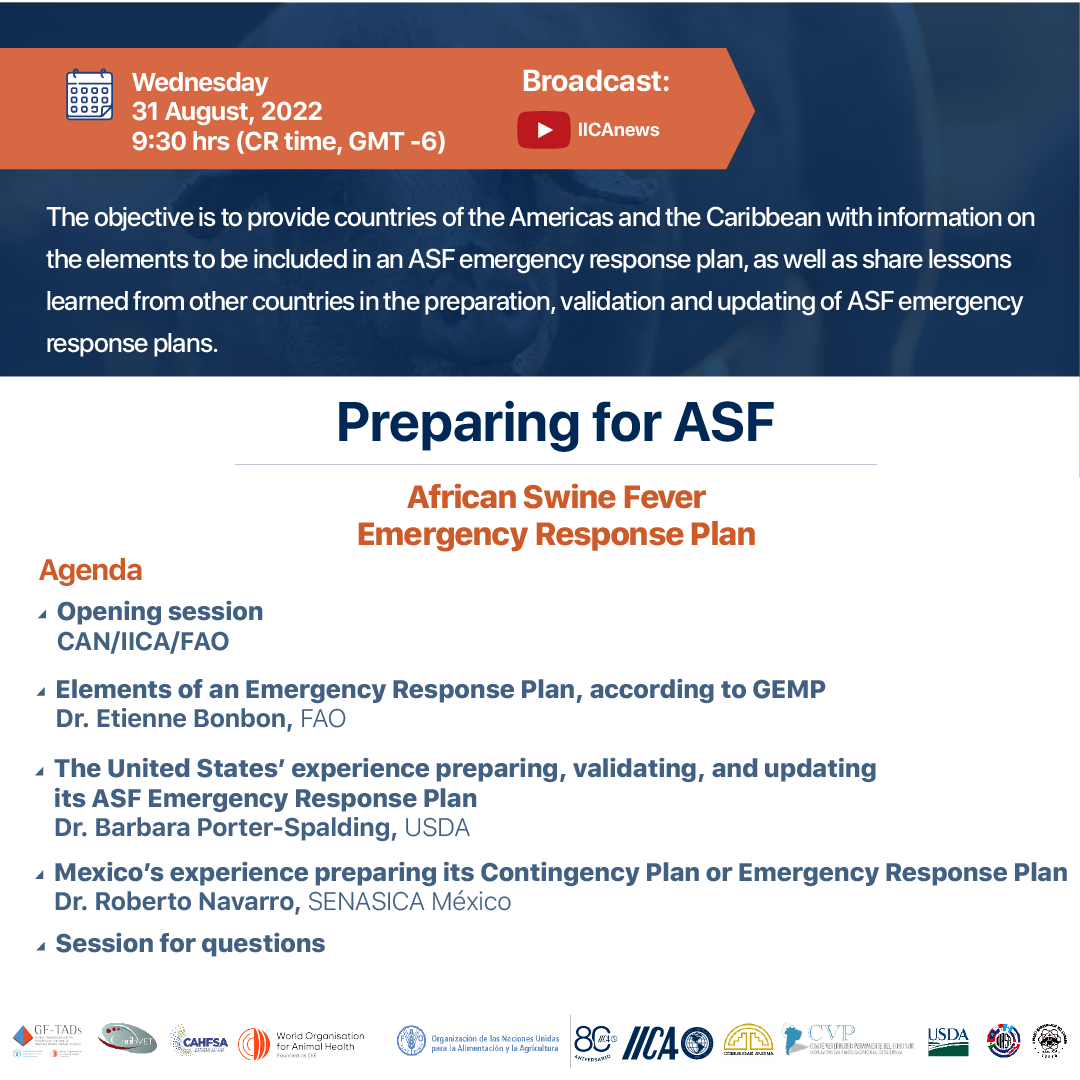
The goal is to provide information to countries in the Americas and the Caribbean on the elements that an ASF Emergency Response Plan must contain, as well as learning from lessons learned in other countries, the processes of preparation, validation and updating of ASF contingency plans.
- Elements in an Emergency Response Plan according to the GEMP, by Dr. Etienne Bonbon, FAO.
- Experience of the USA in the process of preparing, validating, and updating the ASF Emergency Response Plan by Dr. Barbara Porter-Spalding, USDA.
- Experience of Mexico in creating its Contingency Plan or Emergency Response Plan by Dr. Roberto Navarro, SENASICA Mexico.
Etienne Bonbon
Etienne Bonbon has been the lead veterinary advisor of the FAO Emergency Management Centre for Animal Health since May 2017. He obtained a diploma in Veterinary Medicine in 1987, graduated in 1989 and gained a Master’s in Human and Animal Epidemiology in 1991. He was initially a private doctor in rural areas, and from 1991 was public veterinary health inspector of the French Ministry of Agriculture. From 1992 to 2017 he was successively Assistant Director of Veterinary Services in continental France and Martinique; Chief of the Export Unit in the General Office of Food in Paris; Regional Veterinary Assistant for the Near and Middle East in Beirut, and then for the North of Asia in Beijing; Seconded to the European Commission in the Directorate-General for Food Safety in Brussels; Chief of the Communication Unit and Advisor to the Director General of the World Organisation for Animal Health (WOAH, formerly the OIE) in Paris; and Seconded to the Delegation of the European Union at the OECD, UNESCO and the WOAH in Paris. He is president of the WOAH Terrestrial Animals Health Standards Commission since 2015, and was vice-president from 2009; he was re-elected in May 2021 for a mandate of three years.
Barbara Porter-Spalding
A senior staff officer of the USDA, APHIS, Veterinary Services (VS) in Raleigh, North Carolina. She graduated in Veterinary Medicine from the College of Veterinary Medicine of Michigan State University in 1991 and received a Master’s in Public Veterinary Health from North Carolina State University in 2007.
Before joining APHIS, Dr. Porter-Spalding worked in a consultation on dairy products in central-south Pennsylvania. After two years in Morocco with the Peace Corps, she joined the Food Safety and Inspection Service (FSIS) in North Dakota, joining the VS as Field Veterinary Medical Officer in 1998. Since then, “Dr. Barb” has responded to outbreaks of diseases with veterinary services, such as regional epidemiology, porcine personnel officer, and incident commander.
At her current post, Dr. Porter-Spalding is staff officer for national preparedness and incident coordination and runs the National Training and Exercises Program.
Roberto Navarro López
Veterinarian graduated from UAM-X in 1985, diploma in veterinary epidemiology from the UNAM and a Master’s in management of the United Nations Millennium Development Goals. Joined the Mexico-United States Commission for the Prevention of Foot-and-Mouth Disease and other Exotic Animal Diseases in 1990 and is currently the director of this initiative.
Extensive experience in epidemiological surveillance of exotic and emerging diseases. His work has permitted the identification of Venezuelan equine encephalitis virus IE on the coast of Chiapas and the West Nile virus in Tabasco, among others. He has coordinated emergency operations to control and eradicate screwworm in livestock, avian influenza, classical swine fever, among others. He has developed veterinary participation mechanisms for climate phenomena emergencies such as large-scale flooding and hurricanes in Mexico and Latin American countries. He coordinates eco-epidemiological research into avian influenza and vesicular stomatitis in its wild cycles in Mexico. He has trained teams that respond to emergencies in animal health, aquatic animal health and natural disasters in Mexico and Latin America. Consultant to various international organizations (FAO, IICA, OIRSA, USDA) in professional training for addressing emergencies. Professor of epidemiology applied to poultry farming systems in Latin America in the World Veterinary Education in Production Animal Health at Luxembourg University –WOAH. Has over 30 scientific publications in prestigious international peer-reviewed journals, 6 chapters in books and one book, veterinarians in natural disasters PAHO-WHO.



